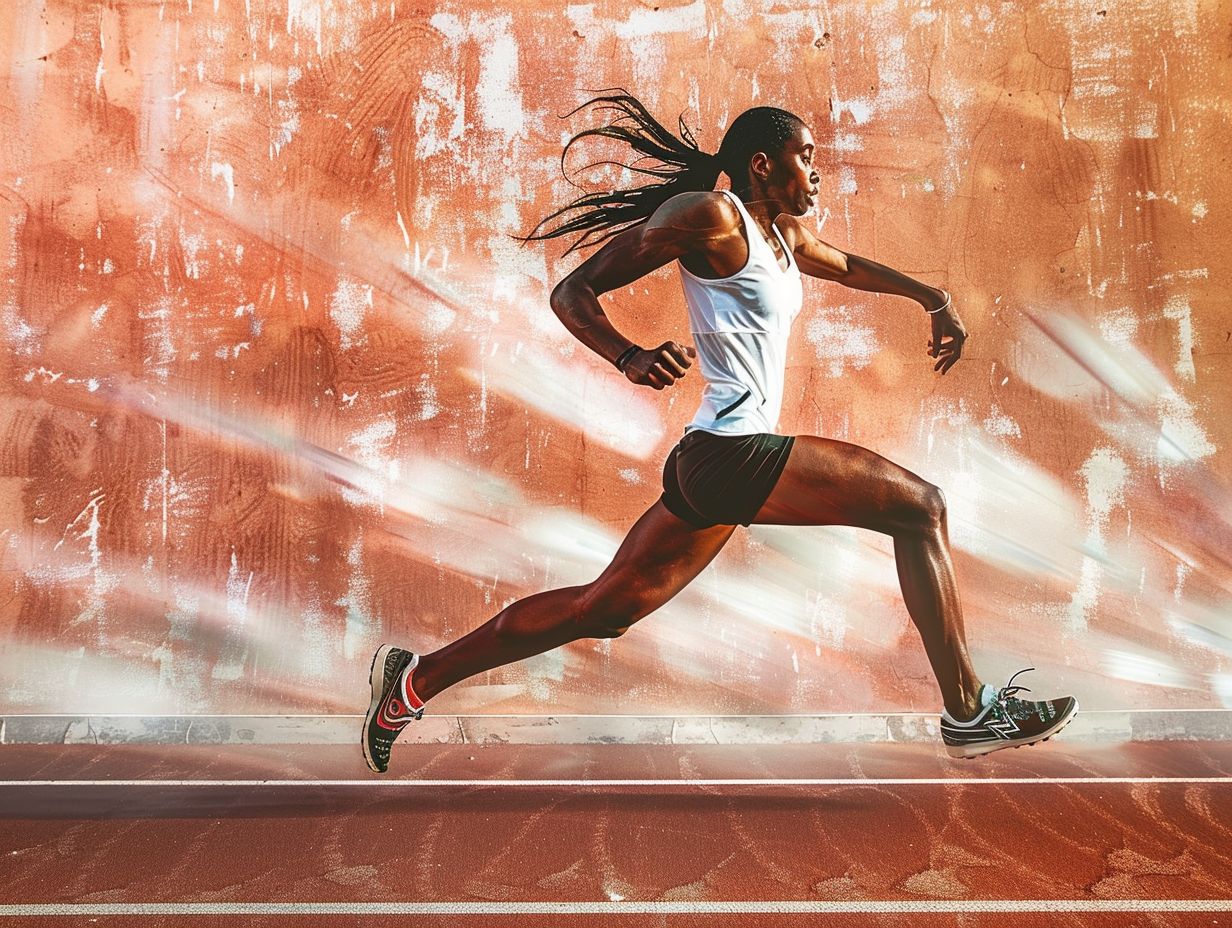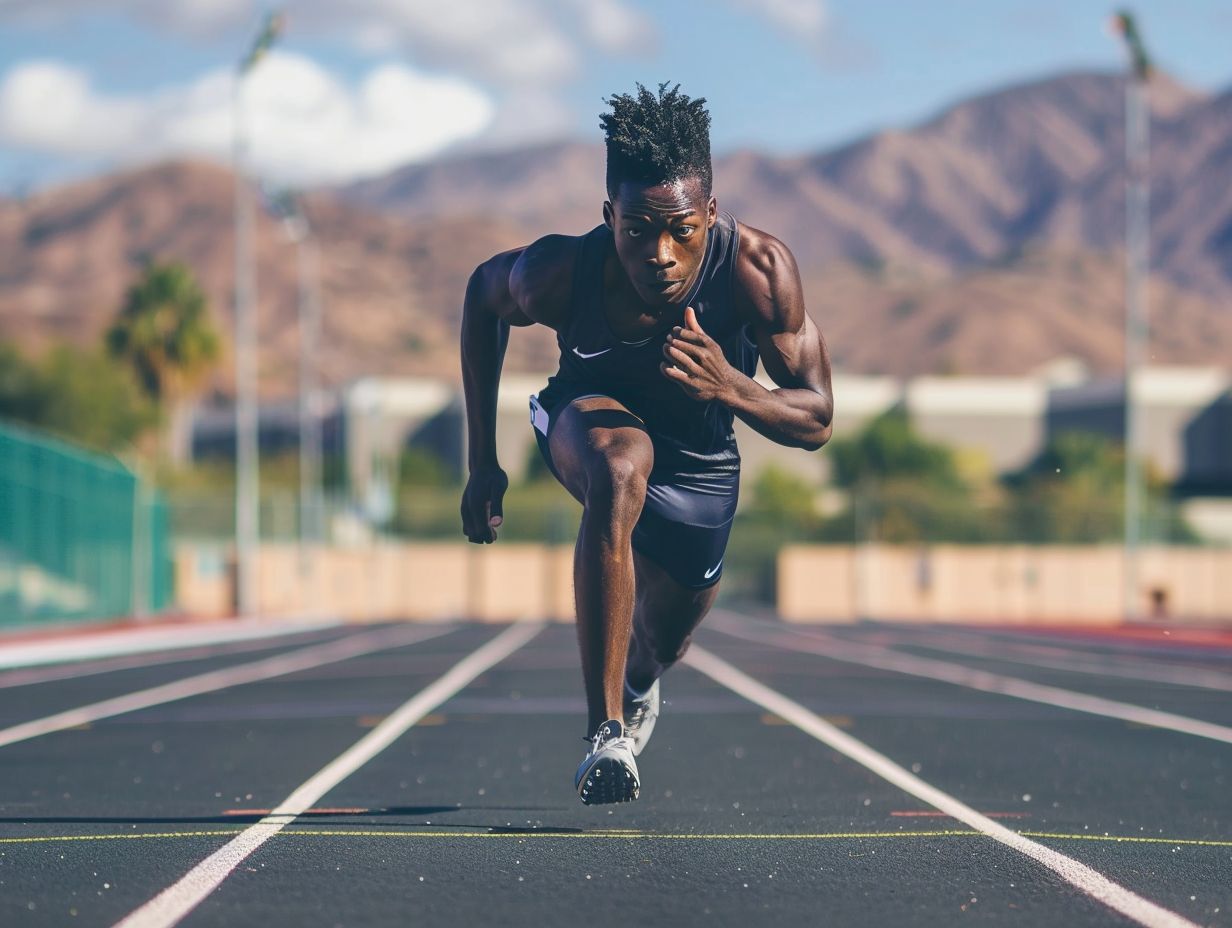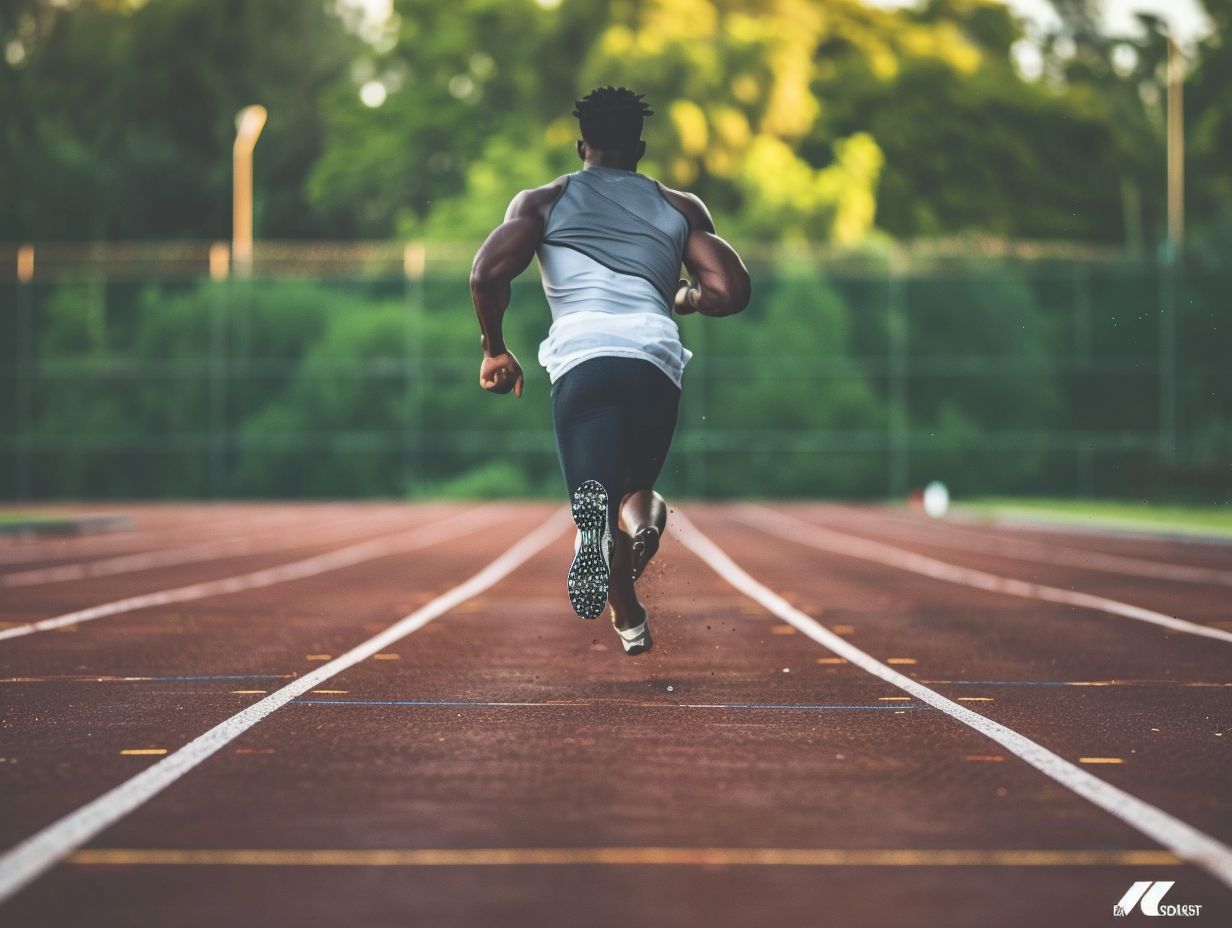Ever thought about what it takes to become a professional runner? From the physical requirements you need to the mental toughness you must have, we’re going to dive into all aspects of professional running.
Let’s chat about the ideal body type for runners, the average running speed of pros, and why endurance, speed, and strength training are crucial. We’ll also explore professional running schedules, the importance of rest and recovery, how to catch the eye of teams, and all the perks that come with being a pro runner.
So, grab your sneakers and come along with us on this journey into the world of professional running!
What is Professional Running?

In the world of professional running, you’re stepping into a competitive arena that requires top-notch athleticism, dedication, and discipline. To shine in races and competitions, you’ve got to bring your A-game.
You’ll find yourself pushing your physical limits, hitting intense training sessions to boost your speed, endurance, and mental fortitude. The drive to win will push you to go all out, embracing the excitement of the race as you chase that top spot on the podium.
With every step you take and every breath you draw, you’re showing the world your unwavering determination and focus. It’s this dedication that propels you forward in the challenging realm of professional running.
What are the Physical Requirements to Become a Professional Runner?
If you want to become a professional runner, you need to have exceptional endurance, speed, and flawless running technique. You’ll need to focus on physical training, including strength workouts to strengthen your muscles, and pay attention to your running form if you’re aiming to go pro.
Endurance is key for a runner because it lets you keep going for longer periods without getting tired. Speed is crucial too, especially if you want to shine in races and competitions. And don’t forget about running technique – it not only makes you more efficient but also lowers the risk of injuries.
By adding strength training to your routine, you’ll build muscle power and boost your overall performance. And always keep an eye on your running form, from your posture to your foot strike and arm movement, to make sure you’re using your energy smartly and avoiding unnecessary strain on your body.
What is the Ideal Body Type for Professional Running?
In terms of professional running, you’ll find that the ideal body type varies depending on the specific discipline within the sport. If you’re into sprinting, you need explosive power and lean muscle mass to propel you down the track with maximum efficiency. Sprinters rely on having a higher percentage of fast-twitch muscle fibers to generate quick bursts of speed. It’s all about being strong yet flexible to excel in those short sprints.
On the flip side, if you’re more of a marathon enthusiast, you’ll benefit from a lean physique that enhances your endurance and long-distance performance. Endurance runners aim for lower body fat percentages to shed any excess weight that could slow them down. Their ideal body composition allows them to maintain a steady pace over extended periods, utilizing slow-twitch muscle fibers for sustained efficiency. It’s all about finding the right balance for your specific running goals.
What is the Average Running Speed for Professional Runners?
If you want to up your running game, it’s all about the training grind. You’ve got to focus on boosting your average speed by working on that race pace, hitting up some killer interval sessions, and fine-tuning your physiological game with things like hill repeats and other targeted workouts.
In terms of keeping that speed up over different distances, nailing your race pace strategy is key. Whether you’re aiming for a steady rhythm in a longer race or throwing in some quick bursts in shorter events, it’s all about pacing yourself right.
And don’t forget about those interval workouts – they’re like your secret weapon. Mixing up intense bursts with rest periods will do wonders for your speed, endurance, and overall efficiency.
Oh, and let’s not overlook your VO2 max. That’s the big daddy of aerobic capacity, so you’ll want to focus on training programs that’ll help you ramp up that oxygen utilization during those tough workouts. It’s all about fine-tuning those physiological factors to become the speed demon you know you can be.
What are the Mental Requirements to Become a Professional Runner?
To become a successful professional runner, you need more than just physical strength. It takes exceptional mental toughness, the ability to set goals, unyielding perseverance, and a deep motivation to push through challenges and setbacks.
If you want to excel as a professional runner, you have to be able to stay focused and overcome obstacles both on and off the track. The mental strength required for elite running is evident in the stories of athletes who faced tough times but never gave up. Take, for example, a well-known marathoner who dealt with injuries but stayed dedicated to rehabilitation and training. This shows the resilience and determination needed to endure the demanding nature of competitive racing. These individuals harness their inner drive and determination, using setbacks as motivation to propel them towards their goals.
What is the Importance of Mental Toughness in Professional Running?
In terms of professional running, mental toughness is key for your success. It’s what helps you not only tackle the physical demands of the sport but also break through those mental walls holding you back.
To build up that mental resilience, you need to connect with the supportive running community and use sports psychology techniques.
By jumping into a running community that’s got your back, you’ll be surrounded by folks who get the highs and lows of the sport. That sense of belonging and encouragement from your peers is gold when it comes to toughening up mentally.
And don’t underestimate the power of sports psychology tricks like visualization, positive self-talk, and setting goals. These techniques can fine-tune your mindset, amp up your confidence, and keep you focused during those races.
With a mix of community support and psychological strategies, you’ll not only crush it in your performance but also face obstacles head-on with a killer resilient mindset.
How Can One Develop Mental Toughness for Running?

When developing mental toughness for running, you need to set clear goals, maintain a positive mindset, practice good sportsmanship, and prioritize injury prevention strategies to keep both your body and mind in top shape. Building mental resilience is an ongoing journey that requires your commitment and a mindset focused on growth.
As you set your running goals, make sure they are specific, measurable, achievable, relevant, and time-bound (SMART). This approach will help you stay on track and motivated, breaking down your big dreams into smaller, manageable steps.
View setbacks as chances to learn and grow, rather than failures. Use challenges to improve your performance, and don’t forget to celebrate every success, no matter how big or small. Recognizing your achievements along the way will give you a sense of accomplishment and boost your confidence.
Don’t forget to mix in some cross-training exercises and make time for proper rest in your routine. This will help prevent injuries and support your overall well-being, allowing you to keep up your peak performance levels.
How to Train for Professional Running?
When you’re training for professional running, you need to take a holistic approach. This means you should include exercises that build endurance, drills to boost speed, strength training sessions, and make sure you give yourself enough time to recover. This approach will help you perform at your best and reduce the risk of injuries.
Endurance is a big deal in professional running. To boost your endurance, you should do long-distance runs, tempo runs, and interval workouts. These activities will help increase your aerobic capacity, improve your heart health, and build mental toughness.
Don’t forget about speed! To get faster, focus on interval training, sprints, and hill repeats. These exercises will activate your fast-twitch muscle fibers and improve your overall speed.
Strength training is crucial too. Incorporate weight lifting, plyometrics, and core exercises into your routine to prevent injuries and generate power.
And last but not least, make sure you prioritize recovery. Rest days, quality sleep, proper nutrition, and taking care of your body are essential for muscle repair, adaptation, and optimizing your overall performance.
What is the Importance of Endurance Training for Professional Running?
Endurance training is key for your running game, especially if you’re eyeing those long-distance races like marathons. It’s all about ramping up that cardiovascular endurance with consistent long runs and nailing down your hydration game to keep your performance strong throughout those lengthy distances.
On top of your long runs, don’t forget about interval training – that’s your ticket to boosting speed and stamina for race day. Mix it up with high-intensity sprints and recovery jogs to level up your aerobic capacity and overall race performance.
And hey, don’t skimp on proper hydration strategies! Keeping that electrolyte balance in check before, during, and after your training sessions is a must to steer clear of dehydration during those grueling long-distance races.
Blend all these training techniques together and focus on your overall cardiovascular fitness. That combo is the winning recipe for marathon success.
What is the Role of Speed Training in Professional Running?
When you’re looking to ramp up your sprinting game, speed training is your best bet. It’s the secret weapon that professional runners use to shave off those crucial seconds, boost their performance, and up their game.
To really nail your speed training, you’ve gotta mix in some track workouts and cooldown routines – they’re the bread and butter of any good speed training plan.
If you want to hit that next level, you’ve gotta get specific with your training. Think interval runs, fartlek sessions, and hill sprints – these are the moves that’ll build your explosive power, crank up your stride frequency, and dial in your muscular endurance. Plus, they target those fast-twitch muscle fibers that you need to kick it into high gear during races.
To make the most out of your speed training, you’ve gotta keep it structured. That means mixing up your distances, intensities, and intervals during your track workouts. And don’t forget about those cooldown sessions – they’re key for keeping muscle soreness at bay, dodging injuries, and making sure you bounce back quickly for your next training sesh.
How to Incorporate Strength Training for Professional Running?
When you’re a pro runner, it’s crucial to incorporate strength training into your routine to boost your muscle power, endurance, and prevent injuries. Make sure you focus on interval training, throw in some stretching exercises, and pick the right footwear – these are all key components of a solid strength training plan for runners.
Strength training is your best buddy when it comes to upping your running game. It helps you build muscle strength and boost your overall endurance. Squats, lunges, deadlifts – these exercises target those key muscle groups like your quads, hamstrings, and glutes, which are all super important for running efficiently and with power.
You’ve gotta love interval training – it mixes things up with high-intensity running bursts and rest periods, giving your cardiovascular fitness and endurance a serious boost. Don’t forget to stretch before and after your runs – it’ll keep you flexible, reduce muscle soreness, and lower the risk of injuries. And, of course, investing in the right footwear is a must to get that support and cushioning you need, reducing the chances of getting hurt during your training or races.
What is a Professional Running Schedule?
In your professional running schedule, you’ll find a mix of structured training sessions, rest days for recovery and rejuvenation, and specific track and field workouts that are all about boosting your performance and tackling your strengths and weaknesses head-on.
All these pieces come together like a well-oiled machine to create a balanced training routine that not only amps up your speed and endurance but also helps keep injuries at bay. With a mix of track and field workouts like intervals, hill repeats, and technique drills, you can target different aspects of your running game and make noticeable improvements.
Don’t forget those rest and recovery days that are strategically placed in your schedule. They give your body the chance to heal up and adapt to all the physical demands of training, setting you up for some seriously awesome performances on race days.
How Many Days a Week Do Professional Runners Train?

You should aim to train like a pro by dedicating six to seven days a week to your fitness routine. Mix things up with running sessions, cross-training activities, and don’t forget those important warm-up and cooldown exercises to keep your fitness levels in top shape and prevent any pesky injuries.
It’s crucial to keep up with your workouts to improve your performance and reduce the risk of overuse injuries. Try adding some cross-training activities like swimming or cycling to give certain muscle groups a break while still staying active. Make sure to include dynamic warm-up exercises and thorough cooldown stretches in your routine to help prevent injuries, prepare your body for exercise, and promote muscle recovery after your workout. Your body will thank you later!
What is the Importance of Rest and Recovery in Professional Running?
Rest and recovery are crucial for you as a professional runner. They give your body the chance to repair, adapt, and steer clear of injuries. Prioritizing proper recovery time can even boost your performance naturally, without turning to banned substances like performance-enhancing drugs.
When you take a break, your body gets to work rebuilding those muscle fibers that took a beating during your intense training sessions. Giving yourself time to recover helps reduce inflammation, which in turn helps prevent overuse injuries that could knock even the most committed runners out of the game. By including smart recovery techniques in your routine, like staying hydrated, getting enough sleep, and adding activities such as stretching and foam rolling, you can up your game while keeping your health and well-being in tip-top shape.
How to Get Noticed by Professional Running Teams?
To get noticed by professional running teams, you need to be actively participating in competitions, following sports ethics and fair play, and showing off skills that make recruiting teams do a double-take.
When you’re looking to catch the eye of professional running teams, it’s all about embodying sportsmanship, both on and off the track. Your behavior not only shows who you are but also makes you stand out as a reliable and respected athlete. By focusing on fair play and acting with integrity, you not only increase your chances of getting scouted but also add to the positive competitive sports vibe. Keep in mind, achieving impressive feats while sticking to sports ethics can be a game-changer for team recruiters and your running career.
What are the Top Professional Running Teams to Join?
When you join the top professional running teams, you get the chance to compete at elite levels, take part in prestigious events like the Olympic Games, and be a part of supportive running clubs that boost camaraderie and skill development.
Belonging to a renowned running team isn’t just about showing off your talent globally – it’s also your ticket to competitions filled with top-tier athletes. The experience of competing at such high levels can really level up your skills and performance. Representing your country at events like the Olympics is a dream for many runners and a huge achievement. The running clubs’ sense of community creates a supportive space where members cheer each other on, swap training tips, and celebrate successes together.
What are the Qualifications and Requirements for Joining a Professional Running Team?
If you want to qualify for a professional running team, you’ve got to meet specific performance standards, lock down sponsorships to cover training and competition costs, and make sure you’re on top of your game with sports nutrition and injury recovery.
To join a pro running team, you need to have outstanding race times that meet the coaches’ or industry’s benchmarks. But it’s not just about performance – you also need to secure sponsorships to pay for travel, gear, and other financial needs.
It’s not just about how fast you can run – you’ve also got to focus on your overall well-being. Proper sports nutrition planning and injury prevention strategies are key. That’s why you need to show that you not only have speed and endurance but also the ability to attract financial support and take care of your athletic development as a whole.
What are the Benefits of Becoming a Professional Runner?
Becoming a professional runner offers you a ton of perks, like chasing down those personal best records, getting your hands on top-notch running gear, and getting a peek into the world of sports science to boost your performance and recovery.
When you break your own records, it’s not just a pat on the back – it’s solid proof of your progress and dedication. So, why not kick things up a notch by rocking those advanced running shoes with responsive cushioning and killer traction? They’ll amp up your performance and help prevent those pesky injuries on any kind of terrain.
And hey, keep yourself in the loop with the latest biomechanics and nutrition research. It’s like having insider knowledge to fine-tune your training and recovery game for maximum efficiency and killer endurance. So, lace up those shoes and hit the ground running!
What is the Average Salary of a Professional Runner?

Your salary as a professional runner can fluctuate quite a bit, depending on factors like sponsorships, endorsement deals, and how well you stick to ethical standards, such as steering clear of doping and maintaining good running manners.
In the world of professional running, scoring those sweet sponsorships from big brands and locking in those high-paying endorsement contracts are key to your financial success. These partnerships don’t just bring in cash; they also boost your visibility through branding and marketing collaborations.
It’s crucial to always uphold ethical behavior because any connection to dodgy practices can damage your reputation and put your future earnings at risk. By staying honest and ethical, you can earn trust and respect in the running community, opening up doors to better opportunities and financial rewards.
What are the Opportunities for Sponsorship and Endorsements for Professional Runners?
As a professional runner, you have the chance to tap into some pretty sweet sponsorship and endorsement deals that can really help you out with your training, keep your finances in check, and give you that extra boost of motivation. But to attract the good sponsors, you gotta make sure your reputation is squeaky clean and you’re putting in the hard work.
These partnerships aren’t just about the money – they’re like having your own personal cheerleading squad, urging you on to reach new heights. In the world of pro running, it’s all about integrity. Staying true to ethical standards and steering clear of any performance-enhancing stuff isn’t just about you; it’s about keeping the sport legit.
Your drive as a runner, fueled by your goals and personal growth, is a big player in your success, both on and off the track. It’s what keeps you moving forward and smashing those milestones.
Frequently Asked Questions
What are the benefits of becoming a professional runner?
Becoming a professional runner can lead to improved physical health, opportunities for travel and competition, and potential financial rewards through sponsorships and prize money.
Do I need to have natural talent to become a professional runner?
While natural talent can certainly be helpful, dedication, discipline, and hard work are often more important factors in becoming a successful professional runner.
How can I improve my running speed and endurance?
Consistent training, incorporating intervals and hill work, and following a proper nutrition and hydration plan can all help improve your running speed and endurance.
What are some common injuries among professional runners?
Some common injuries among professional runners include shin splints, IT band syndrome, and stress fractures. It’s important to listen to your body and seek proper treatment if you experience any pain or discomfort.
How can I find opportunities to compete as a professional runner?
You can find opportunities to compete as a professional runner by participating in local races, joining a running club or team, and researching and applying for elite or professional races and events.
Is it possible to balance a full-time job and professional running career?
Yes, it is possible to balance a full-time job and professional running career. Many professional runners have part-time or full-time jobs that allow them to train and compete at a high level. Time management and prioritization are key in balancing both responsibilities.

